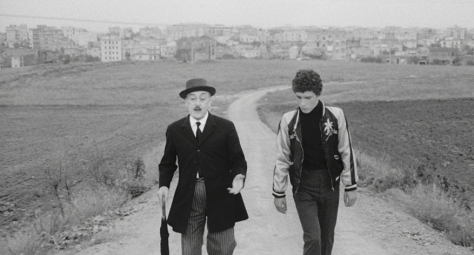Pier Paolo Pasolini’s film The Hawks and the Sparrows begins in one of the most extravagant and astounding ways possible: with the opening credits being song triumphantly by singer Domenico Modugno. The film is a religio-political comedy, but this opening song sets it up, quite tongue-in-cheek, as a travel epic.
The film follows a father (played by famed clown Toto) and his son (Ninetto Davoli), who are laborers on their family farm. The film immediately feels like a sibling film to Pasolini’s Accattone, as both contemplate life and death from the standpoint of class divide. Here, Toto highlights the absurdity of wealth in death, saying that the bum is lucky to die in poverty, as he is giving up nothing in death.
Unlike Accattone, which is a neorealist drama about a poor laborer destined to die, The Hawks and the Sparrows is a picaresque comedy told in two time periods.
The comical fable of The Hawks and the Sparrows is not overtly clear on what Pasolini’s thematic goals are. To the religious, the Sparrows are humble and the Hawks are arrogant. To the Hawks, the concept of God is complicated at the basic understanding of creation. To the Sparrows, they crave for food but are convinced that their impoverished state is good, as God wants them to fast.
All the while, while the Saint and his disciple try to convert Hawks and Sparrows, the humans around them ridicule them incessantly. They do not try to convert these laborers, and the citizens who worship the Saint are driven away as a result.
Pasolini is clearly aiming to skewer religious missionary culture as too broad to really help and only succeeding where agreement over religion already exists. The conversion tactics of the Saint show the Hawks and Sparrows God, but the two groups still fight among each other as members of divergent classes.
However, Pasolini is also not clear on the Marxism of this allegory. The Crow that follows the father-son duo, described as a “left-wing intellectual,” is not wanted by Toto and Ninetto. Yet their travels are to confront the seedy capitalist that determines their economic fate.
Seemingly, all that Pasolini is certain about is the uncertainty of life. We wander through life discussing its intricacies with confidence that our ideologies are correct when truth is anything but absolute.
Beyond the allegory, the film is effectively whimsical as a comedy. There are moments of self-reflective commentary that pokes fun at social systems, as well as scenes of ribald slapstick. And there is no way to ignore the joys of watching Toto and Ninetto whistling to birds and gesturing as if carrying out a normal, human conversation.
As always, thanks for reading!
Like CineFiles on Facebook for updates on new articles and reviews.
—Alex Brannan (@TheAlexBrannan)

